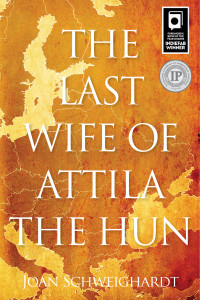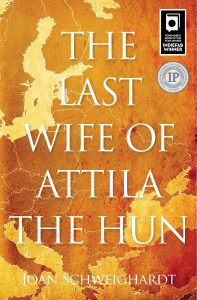Prologue
When I was a young girl living at Worms, there was nothing I delighted in more than song. And of all those who lifted their voices in our great hall, there was none who did so as beautifully as my brother Gunner. Were he beside me now, he would rebuke me for the method that I have chosen to relate my story to you. He would insist, instead, on fashioning a melody for my words and singing them to you from beginning to end.
He would begin modestly, singing, as he always did, that he had no talent for melodies, but entreating you, nevertheless, to remember his words. And, friend, as there is no bird, no summer breeze, no sweet stream lapping or soft rain falling that could compete with Gunner for one’s attention, have no doubt that you would have remembered them.
He would have looked into your eyes while he sang and touched you in a deeper place than he ever touched a man or a woman when he went without his harp.
Though I can never hope to emulate his elegance, let me begin likewise, telling you first that I have no talent either. This thing, this process of setting down one word after the next on parchment, is new to me, and, as a friend once stated, tedious.
And in spite of all the pains that I have taken to learn it, I find that I am apprehensive now because I cannot look into your eyes as my brother would have, because I cannot hope to touch you in that holy place where the hearts of all folk are joined together. Still, I would have you remember my words.
The City of Attila
1
I fell to my knees at the stream, so eager to drink that I did not think to offer a prayer until afterward, when I was satisfied and my flask was full. I was exhausted. My skin was parched and I was filthy; but according to the map my brothers had given me, I was very near my destination. I continued on foot, pulling my tired horse behind me.
I had not had a full night’s rest since the terrain had changed.
The land was flat here. There were no caves or rocky ledges where I could shelter myself. The forests, so sacred to my people, had long since been replaced by endless grasslands. As I trudged through them, I felt that I had left more than my loved ones behind.
When the sky darkened, I used the single live coal I carried from the previous night’s fire to light my torch. I was sure that the light could be seen from some distance. I expected at every moment to hear the thunder of hooves beating on the arid earth. But on and on I walked, seeing no sight other than my own shadow in the gleam of the torch light and hearing no sound but that of my horse plodding along beside me.
When the sun began to rise, I saw that there was a sandy hill ahead, and hoping to see the City of Attila from its summit, I dragged myself on. But the hill was much farther away than it had seemed, and it took most of the day to reach it. And then it was much higher too, the highest ground that I had seen in days. My horse, who was content to graze on grassy clumps and to watch the marmots who dared to peek out of their holes, made it clear that he had no desire to climb.
I had to coax him along, and myself as well, for now I was afraid that I would reach the summit and see nothing but more grass stretching out to the far horizon. I imagined myself wandering endlessly, seeing no one, coughing and sneezing in response to the invisible blowing dust, until my food ran out and my horse gave way.
I crawled to the top of the hill and looked down in amazement at the camp of make-shift tents below. In front of one of them a fire burned, and the carcass of an antelope was roasting over it. There were many men about, perhaps two hundred, all on horseback except for the few tending the fire.
It was not until I heard the war cry that I knew for certain that the scene was real and not some trick of my mind. I had been sighted. The entire company was suddenly galloping in my direction, a cloud of dust rising up around them. I forced myself to my feet and spread my arms to show that I carried no weapon. When I saw that the men were making their bows ready, I dropped my head and lifted my arms higher yet, to the heavens, where, I hoped, the gods were watching carefully.
Part of the company surrounded me. The others rode past, over the summit. When they were satisfied that no one was riding behind me, they joined the first group. Upon the command of one of them, they all lowered their bows. I began to breathe again. A murmur went up, and while I waited for it to subside, I studied their horses. Of the two that I could see without moving my head, one looked like the ones the Romans rode—a fine, tall, light-colored steed.
The other looked like no animal I had ever seen before. Its legs were short and its head was large and somehow misshapen. Its matted mane hung down over its stout body. Its nose was snubbed and its eyes bulged like a fish’s. Its back was curved, as if by the weight of its rider. Yet its thick neck and large chest suggested great strength.
The murmur abated, and the Hun on the horse I'd been scrutinizing cried out a command in his harsh, foreign tongue. I looked up and noted that he resembled his horse. He was short and stout, large-chested, his head overly large, his neck short and thick, his nose snubbed.
The only difference was that while the horse had a long mane and a bushy tail, the Hun’s hair was thin, and his beard, if one could call it that, was thinner yet. He seemed to be waiting for me to speak. I stared at the identical scars that ran down the sides of his face, wide, deep mutations that began beneath his deeply set eyes and ended at his mouth.
“I’ve come to seek Attila,” I said.
The Last Wife of Attila the Hun Description:
Two threads are flawlessly woven together in this sweeping historical novel. In one, Gudrun, a Burgundian noblewoman, dares to enter the City of Attila to give its ruler what she hopes is a cursed sword; the second reveals the unimaginable events that have driven her to this mission.
Based in part on the history of the times and in part on the same Nordic legends that inspired Wagner’s Ring Cycle and other great works of art, The Last Wife of Attila the Hun offers readers a thrilling story of love, betrayal, passion and revenge, all set against an ancient backdrop itself gushing with intrigue.
Lovers of history and fantasy alike will find realism and legend at work in Schweighardt’s latest offering.




